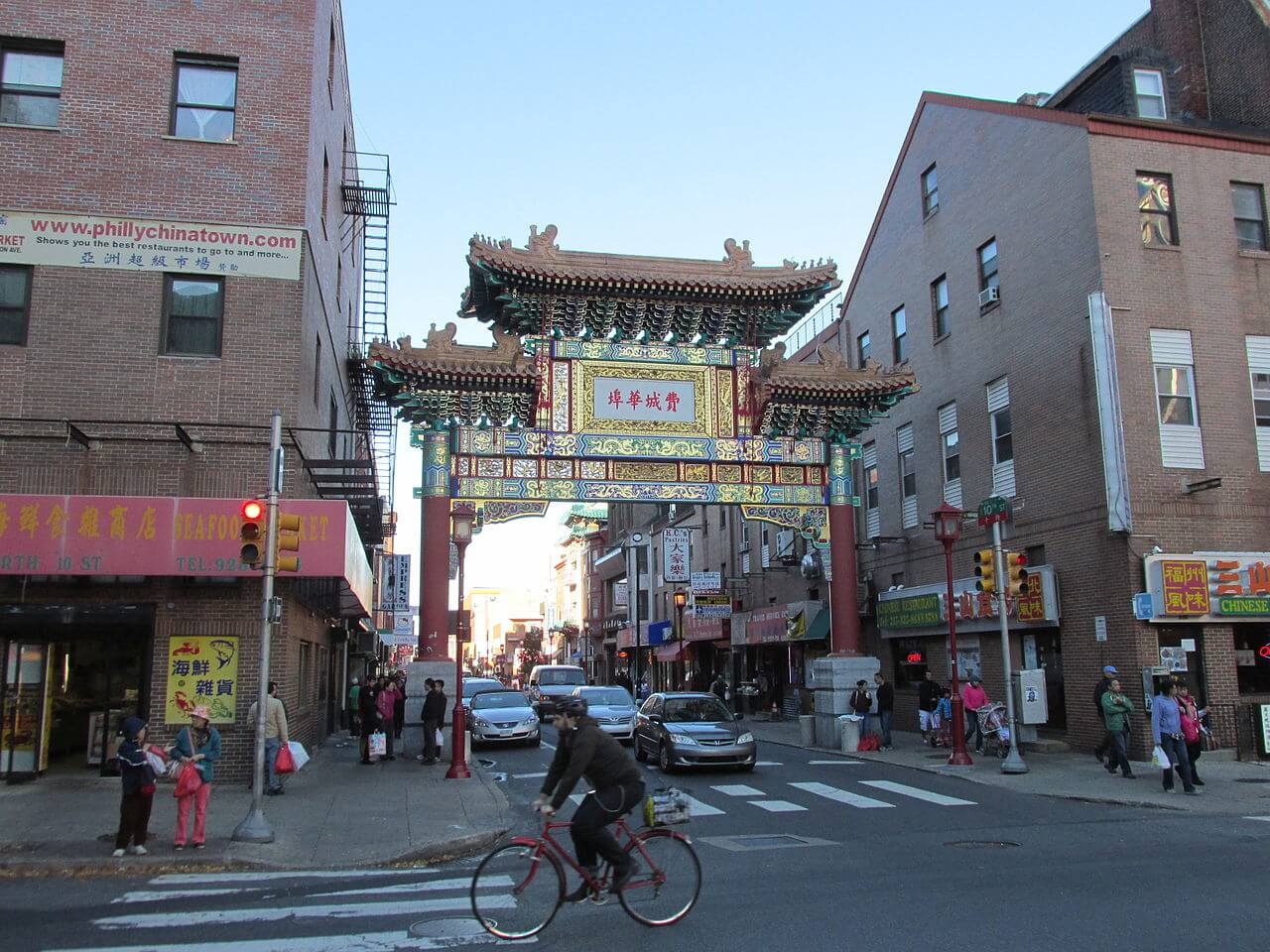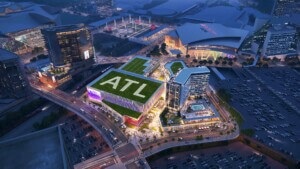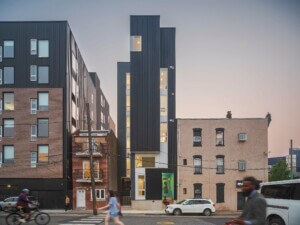A recently published economic study determined that 76 Place, a new stadium designed by Gensler for the Philadelphia 76ers, could cost Pennsylvanians $1 billion in lost tax revenue. The report was by Dr. Arthur Acolin, an associate professor at the University of Washington who specializes in real estate.
76 Place officials have previously stated the new arena in Chinatown will generate 1,000 new permanent jobs, $1 billion in taxes for the city and school district, and $472 million for the state of Pennsylvania over the course of the tentative arena’s 30-year lease. In his report, Dr. Acolin painted an alternative picture of the arena’s overall economic impact.
Existing businesses in Philadelphia’s 19107 zipcode, which includes Chinatown, annually generate $296 million in taxes, a stream that 76 Place may threaten, the report said. Dr. Acolin concluded that, if built, 76 Place could potentially put 566 enterprises out of business, costing nearly 16,000 jobs. This would result in the cumulative loss of $1 billion in tax revenue for the city and state over the arena’s projected 5-year construction period and its ensuing 30-years of operations.
Citing J.C. Bradbury, an economics professor that specializes in stadiums, Dr. Acolin said “arenas and stadiums consistently do not fulfill their developers’ financial promises, and that they do not add to city and state tax base when their true costs are counted.”
Dr. Acolin continued: “76 Place threatens a crucial tax base and economic engine for the city of Philadelphia and the state of Pennsylvania. The disruptions and eventual loss of small and mid-size businesses in the area could have long lasting negative consequences for growth potential in Center City and beyond. Established taxpaying businesses and employees are an asset that could be dismantled if an arena is built. With such a high cost for building an arena, officials would be wise to consider alternative projects that invest and operate in synergy with the existing tax base, rather than jeopardize it. Local businesses and workers generate significant contributions to the local economy that are not easily replaced.”
Bishop Dwayne Royster, executive director of POWER Interfaith, said the megaproject could have particularly negative consequences for workers of color. “This study reinforces that 76 Place would be a monument to exploitation and come at a high cost to children, families, and taxpayers,” he said. “When arenas rise, wages for Black workers plummet and small businesses struggle. Lost wages for Black workers, the erasure of small businesses, and a loss of $1 billion in tax revenue will deepen existing inequity and harm the people who need the most and already get the least.”

In response to the study, Stephen Mullin, an economist from Econsult, a consultancy who works with 76 Place officials on the project, countered the conclusions made in Dr. Acolin’s report. Mullin told AN: “Making assumptions that the City will lose a NET 2.5, 5, or 7.5 percent of existing economic numbers, including businesses, employment, payroll, sales, and taxes, and then cranking the numbers out is not economic analysis. It is 3rd-grade math. The so-called general agreement amongst economists that sports facilities don’t typically measure up to their forecasts is generally associated with a very narrow view of return on public capital investment. The danger of looking at just data and maps and a predetermined outcome is evident here.”
A spokesperson for 76 Place told AN: “To be abundantly clear, this ‘academic study’ is fatally flawed as the underlying research and citations do not actually reach the stated conclusions. Amid this haphazard report’s myriad of issues, there is no explanation of how the researcher arrived at his data, assumptions, or conclusions. If it exists, we encourage the author to submit it to the City for independent analysis as we have done. This should be read for what it is: another attempt by those who oppose the project to obfuscate the truth by pumping out misinformation and half-baked theories instead of engaging in productive dialogue.”
In response to 76 Place’s claims that the report contains “misinformation,” Dr. Acolin told AN: “The data, assumptions and calculations behind the estimates of the potential negative impact on existing businesses are laid out in the brief. The brief relies on evidence from the literature on the impact of new sport arenas and retail centers that find no significant net effect for a range of economic outcomes (sales, employment, taxes) and some negative impacts on some existing businesses (in the 10 to 20% range).”
Dr. Acolin continued: “They are an attempt to highlight 1) the size of the existing business ecosystem in the immediate area around the proposed arena and what these businesses represent in terms of jobs, and tax contributions; 2) how even relatively small negative effects mostly due to substitution effects from existing businesses to the Arena new offerings and from disruption to traffic pattern could offset some or much of the direct benefits from the Arena. These figures are not attempting to provide a definite number as to what will happen if the arena gets built or to get into the details of which businesses will be more affected than others but rather the aim is to initiate a discussion around the magnitude of the potential consequences for existing businesses, their employees and for tax revenues.”
A spokesperson for Gensler told AN the architects cannot comment on the economic study.
Correction: A previous version of this article incorrectly stated that Chinatown businesses create $296 million in taxes. An update was made on February 27 to note that businesses in the 19107 zipcode, which includes Chinatown, create $296 million in taxes; not Chinatown exclusively.











